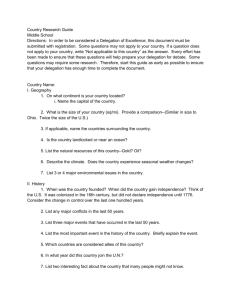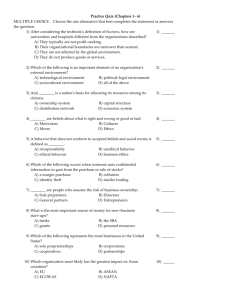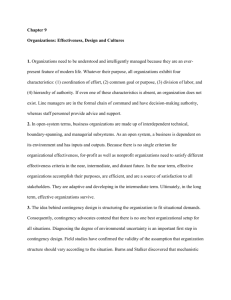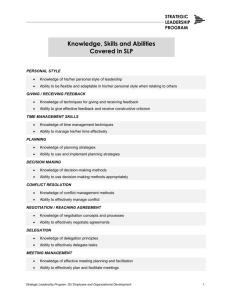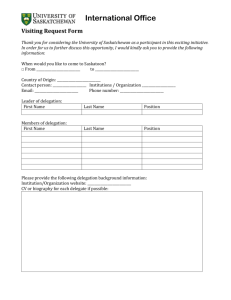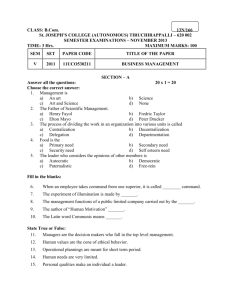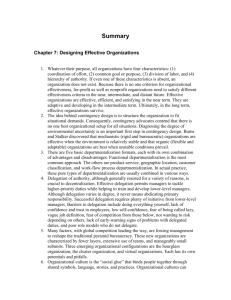DELEGATION OF AUTHORITY AND DECENTRALISATION
advertisement
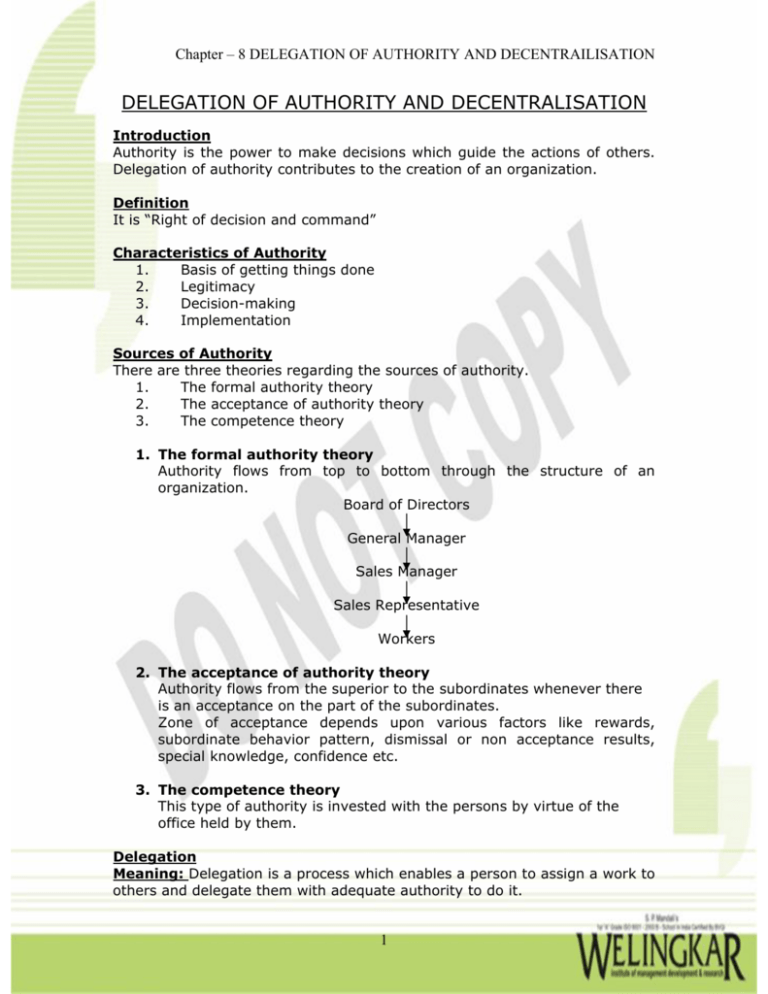
Chapter – 8 DELEGATION OF AUTHORITY AND DECENTRAILISATION DELEGATION OF AUTHORITY AND DECENTRALISATION Introduction Authority is the power to make decisions which guide the actions of others. Delegation of authority contributes to the creation of an organization. Definition It is “Right of decision and command” Characteristics of Authority 1. Basis of getting things done 2. Legitimacy 3. Decision-making 4. Implementation Sources of Authority There are three theories regarding the sources of authority. 1. The formal authority theory 2. The acceptance of authority theory 3. The competence theory 1. The formal authority theory Authority flows from top to bottom through the structure of an organization. Board of Directors General Manager Sales Manager Sales Representative Workers 2. The acceptance of authority theory Authority flows from the superior to the subordinates whenever there is an acceptance on the part of the subordinates. Zone of acceptance depends upon various factors like rewards, subordinate behavior pattern, dismissal or non acceptance results, special knowledge, confidence etc. 3. The competence theory This type of authority is invested with the persons by virtue of the office held by them. Delegation Meaning: Delegation is a process which enables a person to assign a work to others and delegate them with adequate authority to do it. 1 Chapter – 8 DELEGATION OF AUTHORITY AND DECENTRAILISATION Importance of Delegation It is the most important methods of training subordinates and building morals. This helps to concentrate on planning, organizing and controlling. Elements of Delegation 1. Assignment of duties or responsibilities 2. Delegation of authority 3. Accountability Principles of Delegation ¾ Delegation to go by results expected ¾ Delegation of authority but Non-delegation of responsibility ¾ Authority and responsibility should commensurate with each other ¾ Unity of command ¾ Definition of limitations of authority Types of Delegation 1 General delegation means granting authority to the subordinate to perform various managerial functions and exercise control over subordinates. 2 Specific delegation means directions are delegated to a particular person specifically. 3 Writing delegation means delegation by written orders, instructions etc. 4 Unwritten delegation means the authority is delegated on the basis of custom, conversion or usage. 5 Formal delegation means the duties and authorities are shown in the organizational structure of the enterprise. 6 Informal delegation means a person has to use the authority without getting it from the top management. 7 Downward delegation means when a superior could delegate duties and authority to his immediate subordinate. 8 Accrued delegation means a subordinate can delegate his authority to his immediate superiors. 9 Sideward delegation means a person delegate authority to another person who is also in the same rank. Advantages of Delegation ¾ Basis of effective functioning ¾ Saving of time ¾ Reduction of work ¾ Opportunity for development ¾ Benefit of specialized service ¾ Delegation of authority enables effective managerial supervision ¾ Efficient running by branches ¾ Interest and initiative ¾ Satisfaction to subordinate ¾ Expansion and diversification of business activity 2 Chapter – 8 DELEGATION OF AUTHORITY AND DECENTRAILISATION Problems of Delegation 1. Hesitation on the part of Superior 2. Hesitation on the part of Subordinates Hesitation on the part of Superior Reasons for not accepting the authority by the subordinates are as below: 1. Perfectionism 2. Autocratic attitude 3. Directions 4. Confidence 5. Control 6. Avoidance of risk 7. competition 8. Inability of the subordinate 9. Inability of the superior Hesitation on the part of Subordinates Reasons for not accepting the authority by the subordinates are as below: 1. Love of spoon feeding 2. Easier to ask 3. Fear of criticism 4. Lack of Information or resources 5. Lack of self confidence 6. Other work 7. Inadequate incentives 8. Fear of failure Effective Delegation Effective delegation helps efficient accomplishment of the organizational objectives. Steps 1. 2. 3. 4. 5. 6. 7. 8. involved in successful Delegation Establishment of definite goals Developing personal discipline for supervision Establishment of definite responsibility Motivation Determining what to delegate Training Report Control Prerequisite for Effective Delegation of Authority ¾ Superior must understand the authority and responsibility of their own. ¾ Superior must decide the portion of his authority that is to be delegated. ¾ Superior should have knowledge of abilities and inabilities of subordinates ¾ He must ensure the subordinates have understood the delegated work. ¾ He should delegate only the routine functions to subordinate ¾ He must understand the need, importance and value of delegation 3 Chapter – 8 DELEGATION OF AUTHORITY AND DECENTRAILISATION ¾ ¾ ¾ ¾ ¾ ¾ ¾ He should delegate the work which can be performed independently He must dissuade the subordinate from taking decision by themselves He must release the decision making powers to his subordinate Adequate communication network Clear definition of standard of accountability Delegation must be done in accordance with overall plan. Delegation of authority should be confined to organizational structure. Common faults in Delegation 1. Close supervision 2. Lack of direction 3. Lack of accountability Decentralization Decentralization means each section has its own workers to perform activities with the department. Advantages of Decentralization 1. Savings of time 2. Greater efficiency and output 3. Maintenance of secrecy 4. Departmental loyalty Disadvantages of Decentralization 1. No proper division of work 2. Duplication of work 3. No standardization 4. Heavy expenditure Responsibility Meaning: It is the obligation to perform the tasks, functions or assignments. Definition: Responsibility is an obligation to perform certain functions and achieve certain results. Elements of responsibility 1. It arises from superior – subordinate relationship. 2. It ensures from contractual agreement. 3. The responsibility cannot be transferred to anybody. 4. It is created by acceptance of authority 5. There is an essence of obligation 6. The responsibility may be general or specific 7. Responsibility is a continuing process by nature. 4

